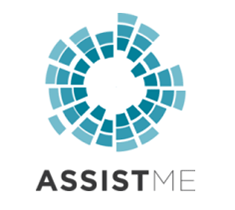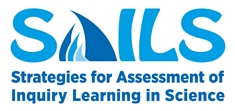ASSIST-ME
ASSIST-ME is a high level research project that investigates formative and summative assessment methods to support and to improve inquiry-based approaches in European science, technology and mathematics education.
PROJECT HAS ENDED
ASSIST-ME is an abbreviation for Assess Inquiry in Science, Technology and Mathematics Education.
Based on an analysis of what is known about summative and formative assessment of knowledge, skills and attitudes, the project designed a range of combined assessment methods. These methods were tested in primary and secondary schools in different educational cultures and contexts in Europe.
Summaries of the research and results are available on this page. The teachers link contains the assessment methods and the materials teachers used to assess them. Teachers and teacher educators can use these materials to assist them in transforming their current teaching and assessment practices. The researchers link contains an overview of the research questions, the research designs, and the project outcomes. Researchers can use these materials to validate and innovate assessment methods in their own contexts. The policy makers link contains the research questions, conclusions from national stakeholders about the utility of project results in various contexts.
Policy Makers
This section allows policy makers to inform decision making on curriculum design, teacher training and assessment strategies at institutional, regional and national levels taking into account relevant system characteristics and variables.
The ASSIST-ME project has worked within the following four main areas, where we sought to investigate how summative and formative assessment can be combined across various European educational contexts. Click on each of the areas to get more information about the National Stakeholder Panel perspectives.
- The main challenges related to the uptake of formative assessment in the daily practices in science, technology and mathematics in primary and secondary schools in different European educational systems
- Changes needed in summative assessment practices
- How formative and summative assessment methods including the use of ICT can be used together to promote learning in inquiry-based STM
- How research-based strategies for the use of formative/summative assessment can be adapted to various European educational traditions to ensure their use and avoid hindrances
Learn more about the background for the research questions in the ASSIST-ME project proposal. (PDF)
In November 2016 we had two final ASSIST-ME conferences, a conference for researchers in Copenhagen and a dissemination conference in Brussels.
The Conference for Researchers
This conference aimed at researchers was held in Copenhagen in November 2016. Each partner country had invited external researchers to get an insight into our research methods (and to engage with them via carefully planned group activities) as well as an insight into and discussions about the project outcomes, and new research directions.
- ASSIST-ME research conference, start-up presentation
by ASSIST-ME project coordinator professor Jens Dolin - Using assessment to change teachers' practices and views
Keynote by Professor Robin Millar - The concept of competence and its relevance for science, technology, and mathematics education
Presentation by professor Mathias Ropohl - The teaching and assessment of inquiry competences
Presentation by Dr. Silke Rönnebeck - Assessment on-the-fly
Presentation by Dr. Christine Harrison - Teachers’ Written Feedback - Aspects of quality, benefits, and challenges
Presentation by ph.d.-fellow Regula Grob - Combining formative and summative use of assessment
Presentation by ASSIST-ME project coordinator professor Jens Dolin - Policy-oriented aspects
Presentation by ASSIST-ME project coordinator professor Jens Dolin
The Dissemination Conference in Brussels
The aim of the conference was to disseminate findings and formulate guidelines and recommendations for policy makers, curriculum developers, teacher trainers and other stakeholders in the different European educational systems to strengthen assessment in STEM inquiry classrooms.
- An outline of the main ideas and the key recommendations from The ASSIST-ME project, presentation by ASSIST-ME project coordinator, professor Jens Dolin
- Opportunities and Tensions with Changes in Assessment Practice, presentation by Dr. Anna Walshe, National Council for Curriculum and Assessment
- Developing Assessment Practices Which Support Pupils’ Inquiry, presentation by Professor Paul Black
- Formative Assessment Methods in Science: Findings from ASSIST-ME, presentation by Professor Costas Constantinou
- Summary of main points from round table group discussions
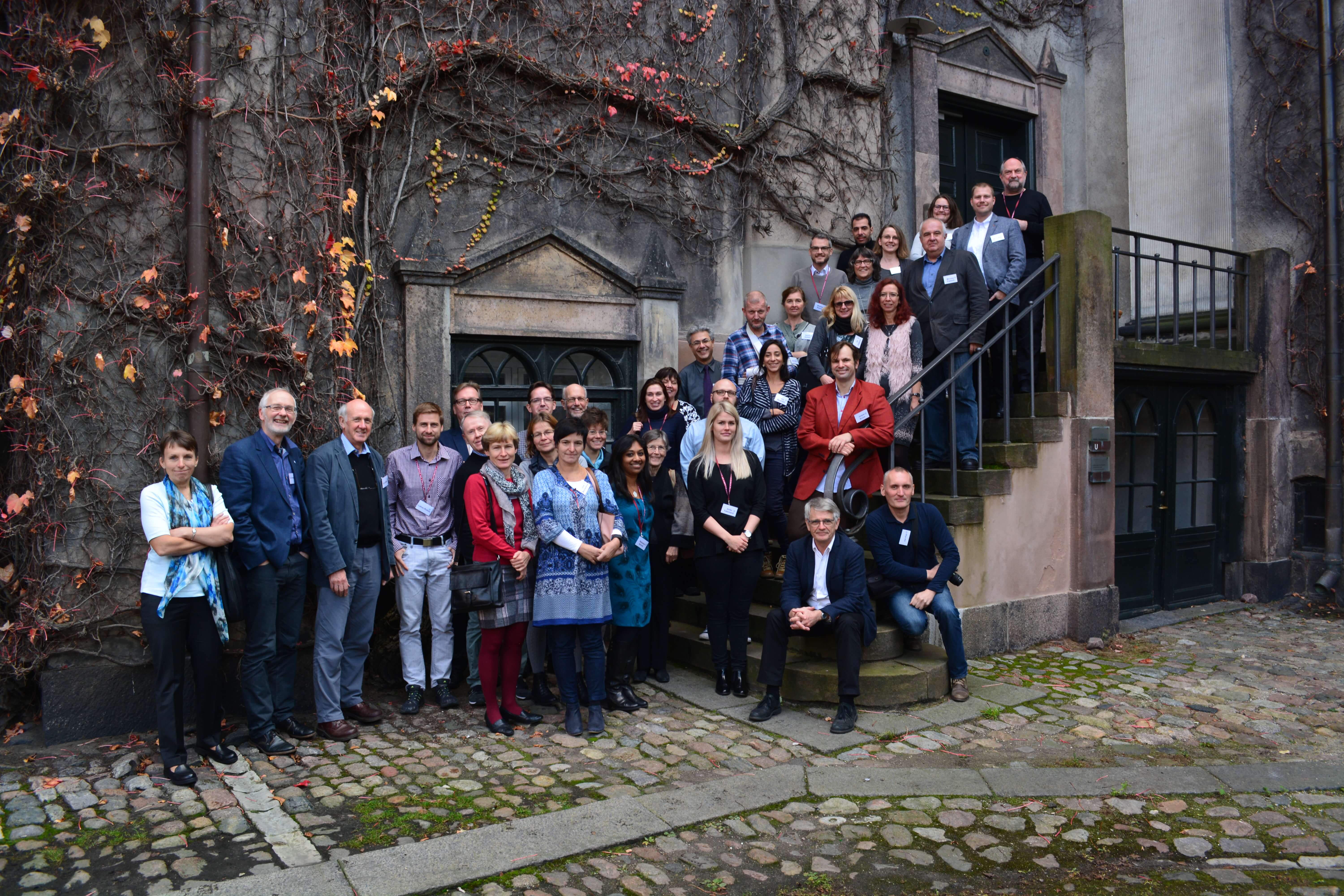
Participants, ASSIST-ME Conference in Copenhagen
Teachers
Teachers and teacher educators can develop effective combinations of formative and summative assessment in daily practice in primary and secondary schools.
ASSIST-ME research results provide suggestions for transforming common teacher formative and summative assessment practices into methods which provide greater feedback on progress for both teachers and students.
Below are four commonly used assessment methods, showing what the project results for each of eight European countries suggests for transforming your current teaching and assessment methods for greater feedback.
Written Feedback
ASSIST-ME suggests the following steps to increase the quality of written feedback to students:
- Students produce certain artefacts (lab reports, ideas for experiments, journals, mind-maps, portfolios etc. associated with the competence in focus.
- Teachers give feedback to the students focused on their artefacts. Written feedback is given to individual students via paper or web based platforms.
- Teachers' feedback is supported through specially designed templates which provide a check-list with the competence in focus for the lesson/the teaching unit and learning progressions.
- Upon receiving comments from the teacher, each student revises the relevant artefact, taking into account the feedback received.
Oral on-the-fly Feedback
SHORT DESCRIPTION OF METHOD
ASSIST-ME suggests the following steps to increase the quality of oral on-the-fly feedback to small groups of students:
- The teacher suggests an activity in order to investigate a hypothesis that emerged during a discussion.
- The teacher poses a question that is intended to promote students' thinking about the topic being discussed.
- The teacher poses clarifying questions to help students furhter articulate a seemingly valid contribution they made.
- The teacher takes the opportunity to use what the student said in order to conclude/provide feedback.
- The students express several ideas that allow the teacher to ask them to compare the ideas.
- The teacher gets a contribution from the students and asks for further explanation with the intent to help them evaluate and adjust their reasoning.
Peer Feedback
SHORT DESCRIPTION OF METHOD
ASSIST-ME suggests the following steps to increase the quality of student-to-student (peer-to-peer) feedback:
- Develop teaching and learning materials targeting relevant competencies.
- Before the implementation, the students should be introduced to the roles of the peer-assessor and the peer-assessee. During the implementation, the students alternate between the two roles.
- As part of the teaching and learning materials, student(s) submit to their peers certain artefacts they produce, associated with the competence under emphasis. These artefacts can be produced either by individual students or by groups of students.
- The student(s) provide feedback to their peer(s). The process of exchanging peer feedback is supported by specially designed templates, which encompass criteria for assessing the specific artefacts. These tools are developed by the teacher. In the ASSIST-ME-project, we used two specially designed templates that you can access by clicking here and here.
Structured Assessment Dialogue
ASSIST-ME suggests the following steps to increase the quality of "structured assessment dialogic feedback:
- Teachers develop teaching and learning materials targeting the competence in focus.
- The teaching plan includes a ritualized conversation (5 minutes) between one student (the student in focus) and the teacher, based on the student's preparation and the teacher's filled-in template mirroring the demands for the competence to be assessed. The teacher has prepared questions that will help mapping student attainment of learning goals in terms of learning progression.
- This is followed by a peer-feedback phase, where the student in focus discusses the dialogue with a group of feedback students (What would be needed in order for the student-teacher dialogue to better cover the learning goal?).
The feedback students are instructed on guidelines for the feedback beforehand.
- During these two interactions, the rest of the class observes and reflects on their own understanding.
- In the end, all students write down reflections about their perceived level of achievement and future learning path using a student self-reflection tool.
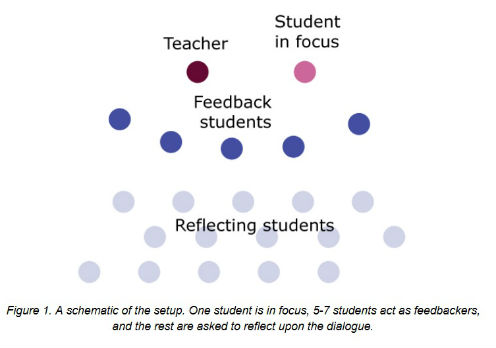
Written Feedback examples
Example: Written feedback and self-assessment to student protocol.
Oral Feedback examples
Example: On-the-fly assessment of deduction of general laws from given experimental results.
Example: On-the-fly and self-assessment of written answers.
Example: On-the-fly assessment of student arguments from a given case study.
Example: Interactions on-the-fly on oral presentations and concept maps.
Example: Interactions on-the-fly on students’ artifacts.
Example: Interactions on-the-fly on students’ discourse.
Peer-Feedback examples
Example: Peer feedback on identified questions
Example: Peer feedback on lab-journal entries
Example: Peer feedback on written data: Lab journal
Example: Peer-assessment of technical sketches
Example: Peer-assessment on students’ artifacts
Structured Assessment Dialogue
Researchers
This section allows researchers to study formative and summative assessment methodologies and practices in different educational systems.
The ASSIST-ME project has four main research questions that sought to investigate how summative and formative assessment can be combined across various European educational contexts:
1. What are the main challenges related to the uptake of formative assessment in the daily practices in science, technology and mathematics in primary and secondary schools in different European educational systems?
1.1 In their efforts to enact innovative inquiry-based teaching sequences, how do teachers approach the need to monitor student learning as it develops? To what extent do they use structured formative assessment and in what formats?
1.2 What systemic support measures and what tools do teachers need in order to integrate fotmative assessment of student learning in their clasroom practice?
2. What changes are needed in summative assessment practices?
2.1 To bring them into consistency with the learning aims of IBE in STM?
2.2 To ensure that they support and do not inhibit the practice of formative assessment?
3. How can formative and summative assessment methods including the use of ICT be used together to promote learning in inquiry-based STM?
4. How can research based strategies for the use of formative/summative assessment be adapted to various European educational traditions to ensure their use and avoid hindrances?
4.1 How can the diverse roles of summative and formative assessment be clearly delineated for teachers and what strategies can help them make appropriate use of both, each to fit its own purposes?
4.2 How can relevant stakeholders be invited to take co-ownership to the research results and how can a partnership between researchers, policy makers, and teachers be established in order to secure relevant actions following implementation guidelines?
Read more about the background for these research questions in the ASSIST-ME project proposal.
Written feedback
Focus: Investigation of the potential of certain tools to facilitate the effective implementation of the assessment method “Written feedback” by supporting teachers’ attempt to interpret students’ data, diagnose difficulties/needs and provide them with productive feedback.
Oral feedback
Focus: In-depth analysis of the enactment of the assessment method “interactions on the fly” in certain situations as well as documentation of relevant challenges.
Peer-feedback
Focus: Investigation of the facility of peer feedback to serve as an effective method for formative assessment and exploration of the potential of a specific tool to enhance it.
Structured-assessment
Focus: Exploration of the facility of structured assessment dialogue to serve as an appropriate context for formative assessment.
The project consists of seven work packages (WP). Each work package is governed by a project partner, and is concerned with different aspects of the ASSIST-ME project.
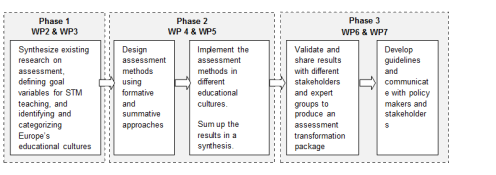
(PDFs WITH LINKS)
WP1: Project Management
Objectives:
- To create and maintain a harmonious, balanced and mutually beneficial environment within the consortium for all partners and enforce high standards for project deliverables.
- To interface with the European Commission and other institutions involved in innovative processes and with specific programmes and development strategies.
- To manage the overall consortium’s legal, contractual, financial and administrative aspects; ensure that partners obtain audit certificates and financial security when requested by the Commission.
- To ensure overall quality of project deliverables throughout the duration of the project in relation to their objectives.
- To ensure that each work package is in step with all other work packages and that there are enough resources to carry out the work planned at any point throughout the project.
- To seek high visibility for the project through project website, the SCIENTIX platform, regional networks and media
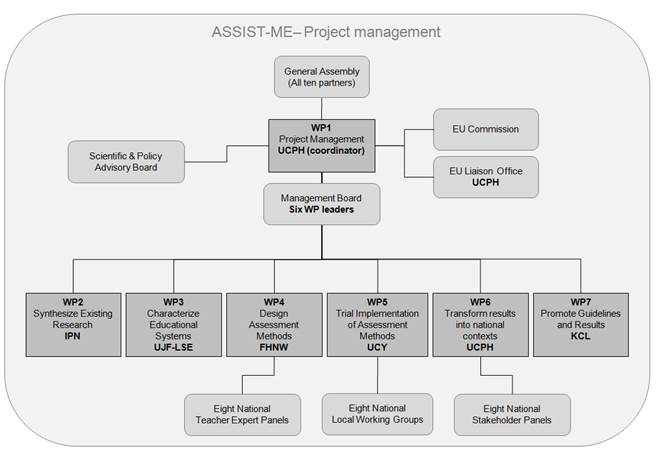
Outcomes:
Deliverable number |
Title |
| D 1.3 |
WP2: Synthesize Existing Research
Objectives:
- To review what we know about formative and summative assessment of competences in STM and what methods can work to improve student outcomes, including use of ICT tools.
- To collect recent work that has been conducted in the partner countries on assessment in STM.
- To synthesize the outcomes from other EU-projects on IBE, e.g., Mind The Gap, S-TEAM, ESTABLISH, Fibonacci, INQUIRE, Primas, SAILS.
- To formulate an operational definition of IBE related to STM and give guidelines for measuring the degree of IBE.
- To provide recommendations for WP4 and WP5.
This work package has provided a review of the existing research on inquiry-based education in STM with a particular focus on the role that formative and summative assessment play for successful learning in STM classes. Beyond the synthesis of international research literature, particular emphasis has been be put on collecting data about the current research on assessment in all partner countries. Thus WP2, led by IPN, has formed a basis for the development of new ideas in formative assessment in inquiry-based STM education (see WP4 and WP5).
Outcomes:
WP3: Characterize Educational Systems
Objectives:
- To identify educational system variables with relevance to formative or summative assessment and IBE in STM
- To map out the participating countries with respect to these variables.
- To provide the consortium and especially WP4, WP5 and WP6 with systemic information needed for trial implementations.
Outcomes:
WP4: Design Assessment Methods
Objectives:
- To determine and finalize a list of formative assessment methods that will be tested.
- To describe ways to combine these formative methods with summative assessment methods.
- To determine the competences that are the outcome of the inquiry-based lessons.
- To map out a matrix which relates the assessment methods to domain specific and transversal competences.
- To develop an assessment protocol, i.e. specific guidelines for each assessment method and how to monitor it in daily instruction
Outcomes:
Deliverable number |
Title |
| D 4.4 | Manual for Teacher Expert Panels |
| D 4.7 | Description of the ASSIST-ME assessment methods and competencies (Practical examples) |
WP5: Trial Implementation of Assessment Methods
Objectives:
- To steer and coordinate the research on the trial implementation processes of the formative assessment methods from WP4 on the basis of WP2 and WP3 outcomes.
- To describe a frame for the trial implementations of the assessment methods and to plan a distribution of the methods among the partners securing coverage of all variables for all subjects and educational levels.
- To decide the methods used for research of the trial implementations of the assessments.
- To collect data from all partners and sum up the results in a synthesis.
Outcomes:
Deliverable number |
Title |
| D 5.11 | Synthesis of factors determining the uptake of various assessment methods in different educational settings |
WP6: Transform Results into National Contexts
Objectives:
- To assure a national stakeholder involvement throughout the project.
- To align the research processes with the understanding and perspectives of the stakeholders for enhancing the feasibility of the results.
- To secure a meaningful communication between researchers, teachers, and stakeholders (including policy makers).
- To refine the project's assessment methods and procedures based on stakeholder feedback.
- To select the main findings and describe them in easily understandable formats.
Outcomes:
WP7: Promote Guidelines and Results
Objectives:
- To develop guidelines for promoting actions on national and supranational levels that encourage teachers and schools to integrate formative assessment strategies in IBE.
- To formulate recommendations for policy makers and other stakeholders.
- To maximise the impact of ASSIST-ME through a variety of dissemination activities with user communities including policy makers and other stakeholders.
- To use media exposure to support and communicate evolving project findings.
Outcomes:
Deliverable
|
Title |
|
D 7.2 |
|
| D 7.3 | Recommendations for Policy Makers and Other Stakeholders |
Project overview
Assess Inquiry in Science, Technology and Mathematics Education
The overall aim of ASSIST-ME project has been to provide a research base on effective uptake of formative and summative assessment for inquiry-based, competence oriented Science, Technology and Mathematics (STM) education. This was done in primary and secondary schools in different educational contexts in Europe. The research base was used to give policy makers and other stakeholders guidelines for ensuring that assessment enhances learning in STM education. In order to do this, the project goes through three phases shown below. Phase 1 is about establishing a foundation for the project. This phase consists of an analysis of what is known about summative and formative assessment of knowledge, skills and attitudes related to key STM competences and an analysis of European educational systems.
Phase 1 is about establishing a foundation for the project. This phase consists of an analysis of what is known about summative and formative assessment of knowledge, skills and attitudes related to key STM competences and an analysis of European educational systems.
Phase 2 is about finding results. Based on the analysis from Phase 1 the project will in Phase 2 design a range of combined assessment methods. These methods will be tested in primary and secondary schools in different educational cultures in Europe in order to analyse the conditions that support or undermine the uptake of formative assessment related to inquiry processes.
Phase 3 is about influencing and dissemination. In Phase 3 the resulting synthesis of opportunities and restrictions for implementing an assessment culture using both formative and summative approaches will be evaluated and discussed in relevant forums. This will be done in order to formulate guidelines and recommendations for policy makers, curriculum developers, teacher trainers and other stakeholders in the different European educational systems.
The project consists of seven work packages. Each work package is concerned with different aspects of the ASSIST-ME project. As the projects goes through each of the three phases focus will be put on each of the work packages. Read more about each of the work packages in project outcomes.
During the ASSIST-ME project various assessment methods will be tested in order to make an empirically grounded research base for the project.
Implementation rounds
In the beginning of the second phase of the ASSIST-ME project four assessment methods were designed. In order to test the designed methods, the methods will be implemented in selected primary and secondary schools in Europe. During the project three implementation rounds will be carried out, lasting 6 months each.
The first implementation round began in September 2014, and ran until the first of February 2015. The first round was seen as a trial round were teachers and researchers had the opportunity to get to know each other, understand the research designs and work through whatever obstacles that may appear during an implementation round.
The second implementation round will run from February 2015 until the summer of 2015 with the end of the school year.
The third implementation round will run from august 2015 until February of 2016.
Assessment, research designs and competencies
In each partner country teachers from primary and secondary schools are a part of the ASSIST-ME project. In the classes the teachers will, during the implementation rounds, evaluate their students based on the different designed assessment methods. In order for the researchers to capture these assessment methods in a research setup, the methods have been transformed into five research designs.
The teachers will during the implementation rounds implement inquiry based science education (IBSE) in their classes. In addition to this the teachers will design their teaching so that it promotes selected key STM competencies.
Each partner country will together with their teachers choose the research designs and competencies they are interested in working with during the implementation rounds.
Listed the ASSIST-ME project is working with:
4 assessment methods:
- Questioning and other interactions on the fly
- Structured classroom dialogue
- Marking (grading and feedback)
- Student peer and self-assessment
5 research designs:
- Interactions ”on the fly”
- Structured Classroom Dialogue
- Marking (Graded and written comments)
- Marking (Graded and written comments)
- Peer feedback
6 competencies:
- Empirical investigations in science
- Problem solving in mathematics
- Design in engineering/technology
- Argumentation
- Modelling
- Innovation
The first three competencies are subject specific and will be the same for each implementation round. The last three competencies are generic, and can be used for all subjects.
Read more about the design of assessment methods in WP4.
Read more about the implementation of the assessment methods in WP5.
2013
| January | Kick-off meeting of the ASSIST-ME project in Copenhagen, Denmark General Assembly meeting no. 1 and Management Board meeting |
| At this meeting the partners began the work on synthesizing the existing research on assessment and on characterizing the educational systems of all the partner countries. | |
| June | Management Board meeting (virtual) |
| August | Working meeting in Berlin, Germany |
| At this meeting the partners looked at previous research done on assessment in Science, Technology and Mathematics (STM). | |
| September | Management Board meeting at the ESERA Conference, Cyprus |
| At this meeting the finishing parts of the research on assessment in STM and Inquiry Based Education (IBE) was discussed. The ongoing work on characterizing educational systems of each partner country, and the preliminary drafts to the assessment methods have been designed was presented. | |
| October | Working meeting in Basel, Switzerland |
| At this meeting the partners discussed the design of the assessment methods, and how the Teacher Expert Panels would be used in this process. | |
| December | Scientific & Policy Advisory Board (SPAB) meeting in Copenhagen, Denmark |
| At this meeting status of the project was presented to the SPAB with the SPAB giving feedback and input to future work. | |
| December | Management Board meeting (virtual) |
| At this meeting the final work on characterizing educational systems was discussed. The ongoing work on designing assessment methods was presented, and feedback on the preliminary designed methods from the partners is going to be incorporated into the designs. |
2014
| February | Working meeting in London, England |
| At this meeting work continued on the design of the assessment methods for the implementation rounds. | |
| May | Working meeting in Copenhagen, Denmark |
| At this meeting work continued on the research plans for the implementation rounds should be designed. | |
| April | Management Board meeting (virtual) |
| At this meeting the partners shared their experiences with their Teacher Expert Panel (TEP) and their National Stakeholder Panel (NSP). | |
| June |
General Assembly meeting no. 2 in Zürich, Switzerland Management Board meeting |
| At this meeting the partners worked on designing research plans for the implementation rounds. | |
| September |
Working meeting in Prague, Czech Republic |
|
At this meeting the partners continued to work on the design of the implementations rounds and discussed how to practically carry these out. |
|
| September |
Management Board meeting in Prague, Czech Republic |
|
At this meeting the partners met to sum up the project so far in order to establish a common understanding of the project and to aligning the national research agendas with the common research questions. |
|
| September |
First implementation round in the classrooms began in all partner countries |
| November |
First round teacher questionnaire sent out to teachers and control teachers |
2015
| January | Working meeting in Copenhagen, Denmark |
| At this meeting the partners will share their experiences of the Local Working Groups (LWG) from the first implementation rounds and their experiences with the National Stakeholder Panels (NSP). | |
| February | Second implementation round in the classrooms begins |
| September | General Assembly no. 3 at the ESERA conference |
2016
General Assembly no. 4
2017
The ASSIST-ME project will be completed
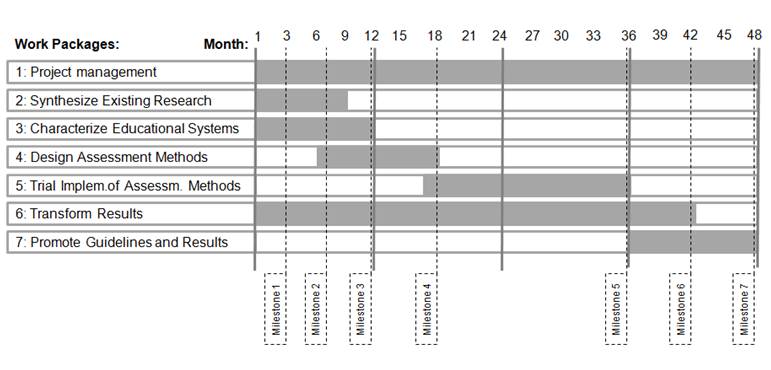
Timing of the project; from month 1 in January 2013 to month 48 in December 2016.
Participating organisations |
Acronym |
Country |
Contact person |
|
University of Copenhagen, Department of Science Education (Coordinator) |
UCPH |
Denmark |
Professor Jens Dolin |
|
University of Kiel, Leibniz Institute for Science and Mathematics Education |
IPN |
Germany |
Head of Department, Professor Olaf Köller |
|
University of Cyprus, Department of Educational Sciences, Learning in Science Group |
UCY |
Cyprus |
Professor Costas Constantinou |
|
Fachhochschule Nordwestschweiz, Center for Science and Technology Education |
FHNW |
Switzerland |
Head of Center, Professor Peter Labudde |
|
Centre National de la Recherche Scientifique, Lyon, ICAR, ENS Lyon |
CNRS |
France |
Florence Le Hebel |
|
King's College London, |
KCL |
UK |
Dr Chris Harrison |
|
University of Jyväskylä, Department of Teacher Education |
JYU |
Finland |
Professor Jouni Viiri |
|
University Joseph Fourier Grenoble 1, Teacher Education Institute, Educational Science Laboratory |
UJF |
France |
Professor Michel Grangeat |
|
JU |
Czech Republic |
Professor Iva Stuchlikova |
|
|
PEI |
UK |
Dr Rose Clesham |
The management structure of ASSIST-ME has three layers:
- The General Assembly is responsible for the overall administrative and financial aspects of the project.
- The Management Board is responsible for the scientific aspects of the project.
- The coordinator is responsible for the day-to-day management of the project.
In addition to the management several other actors are involved in the project. The figure below gives an overview of the ASSIST-ME project management and the relations between work packages, Advisory Board, Panels and the Local Working Groups of teachers. Read more about the various actors here (PDF).
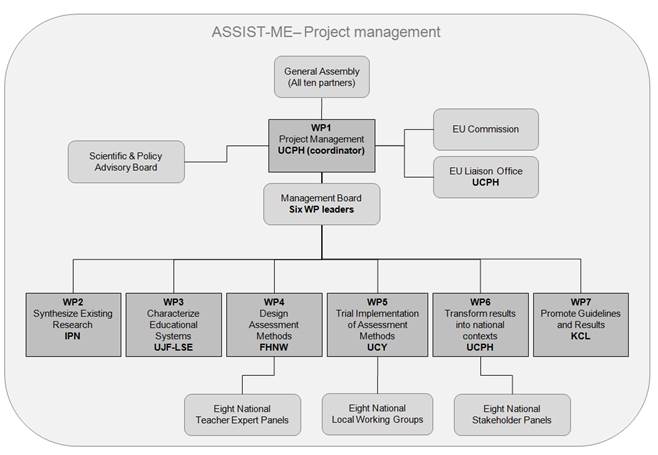
Resources
Here you can find various publications and other project material aimed at researchers and stakeholders
The aim of the ASSIST-ME Report Series is to provide insight into results from the project. The reports are peer reviewed by project participants belonging to other institutions than the author.
|
Report Series No. 1 |
The book is available as print on demand at lulu.com |
|
Report Series No. 2 |
The book is available as print on demand at lulu.com |
Below you can find articles and conference papers related to the ASSIST-ME project.
Articles
| ASSIST-ME reference list | |
| POHLEDY NA FORMATIVNÍ A SUMATIVNÍ HODNOCENÍ ŽÁKA V ČESKÝCH PUBLIKACÍCH | |
| Formative Assessment and other Assessment Methods in Biology Education and Pre-service Biology Teacher Training in the Czech Republic | |
| FORMATIVE ASSESSMENT METHODS IN BIOLOGY EDUCATION: PEDAGOGICAL STUDY AT PRIMARY SCHOOL IN THE CZECH REPUBLIC | |
| Evaluering mellem mestring og præstation | Mona, 2016(1), 51-62 |
Conference Contributions
| Basis for implementation of research on formative assessment in inquiry-based education | |
| Kan formativ evaluering også bruges summativt?. | Abstract from Big Bang 2016, Aarhus, Danmark |
| Få redskaber til at anvende læringsprogression | Abstract from Big Bang 2016, Aarhus, Danmark |
| Affordances and Challenges of Written Feedback as Formative Assessment in Inquiry-Based STEM Education | Abstract from NARST, Baltimore, USA |
| The viability of written feedback as part of formative assessment in IBSTME | Abstract from ESERA 2015, Helsinki, Finland |
| ASSESSMENT IN INQUIRY BASED EDUCATION IN PRIMARY MATHEMATICS. |
Here you can find various materials from presentations that have been given by the ASSIST-ME partners at various conferences, seminars etc. Some of the materials are in country-specific languages, others are in English.
Presentations by Fachhochschule Nordwestschweiz, FHNW
|
Inquiry-Based Learning: Von einer Definition hin zum formativen und summativen Assessment |
|
|
Formative Beurteilung im forschendentdeckenden Unterricht in den Naturwissenschaften |
|
|
Formative Assessment in Inquiry Based Science Education |
|
|
Implementing formative assessment methods in inquiry-based science education in Switzerland |
|
|
Formative Assessment Methods for Inquiry Learning (ESERA, 2015) |
|
|
Diagnose und Feedback durch die Lehrperson im Rahmen «formativen Assessments» am Beispiel von schriftlicher Beurteilung |
|
|
Methods of formative assessment for inquiry learning (NARST, 2016) |
Presentations by University of South Bohemia in České Budějovice, JU
|
ASSIST- ME: výzkumný projekt ověřující možné postupy formativního hodnocení při badatelsky orientované výuce přírodovědných oborů a matematiky |
|
|
FORMATIVNÍ HODNOCENÍ V BADATELSKY ORIENTOVANÉM VYUČOVÁNÍ V PŘÍRODOVĚDNÝCH PŘEDMĚTECH A MATEMATICE |
|
|
FORMATIVNÍ HODNOCENÍ V ČESKÉ REPUBLICE – IMPLEMENTACE PROJEKTU ASSIST-ME |
|
|
TEACHERS’ AND STUDENTS’ NEEDS RELATED TO IMPLEMENTATION OF FORMATIVE PEER ASSESSMENT IN IBSE IN CZECH SCHOOLS (first findings of ASSIST-ME Project) |
|
|
PROJEKT ASSIST-ME: VÝZKUM FORMATIVNÍHO HODNOCENÍ V BADATELSKY ORIENTOVANÉM PŘÍRODOVĚDNÉM A MATEMATICKÉM VYUČOVÁNÍ |
|
| FORMATIVE ASSESSMENT METHODS IN BIOLOGY EDUCATION: PEDAGOGICAL STUDY AT PRIMARY SCHOOL IN THE CZECH REPUBLIC | |
| Metodické problémy sběru dat pro účely formativního hodnocení badatelsky orientované výuky přírodovědy. | |
| METODICKÉ PROBLÉMY SBĚRU DAT PRO ÚČELY FORMATIVNÍHO HODNOCENÍ BADATELSKY ORIENTOVANÉ VÝUKY PŘÍRODOPISU | |
| STUDENTS' ATTITUDES TO PEER-ASSESSMENT IN INQUIRY-BASED TASKS IN BIOLOGY LESSONS AT LOWER SECONDARY LEVEL | |
| Formative assessment methods appropriate for use in empirical investigations in biology lessons at primary school in the Czech Republic | |
|
Formative assessment in inquiry based elementary mathematics. |
|
| Alena Hospesova, 2016. ICME, invited lecture at 13th International Congress on Mathematical Education (July 24 - 31, 2016; Hamburg, Germany) | - |
Presentations by the University of Copenhagen, UCPH
| Structured Assessment Dialogue (SAD) - Linking structure in teacher-student dialogue to student self-assessment |
Here you can find materials and results from the participating countries
Project Supporter
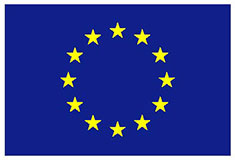
ASSIST-ME was supported by FP7.
Project: ASSIST-ME
Start: February 2013
End: December 2016
Contact
Jens Dolin, Project Coordinator, Leader of WP1
Robert Evans, Project Manager, Leader of WP6
Anne Oftebro-Svendsen, EU-officer, liaison with EC
Project Outcomes
The project consists of seven work packages (WP). Each work package is governed by a project partner, and is concerned with different aspects of the ASSIST-ME project.


